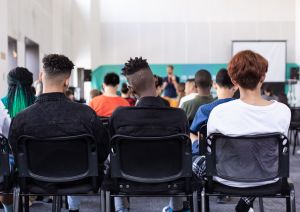“Dead Poet’s Society” is the only movie I ever saw in the theatre multiple times. 4 times, to be exact. I just watched it again with my teenage sons, paying $3.99 to stream it on Amazon Prime. It’s worth it, even if there are a million problematic things about the movie that I wasn’t primed to notice in 1989. I mean, ugh… the privilege, the deafening masculinity, the utter homogeneity of the student body and faculty… not exactly a model of inclusion, diversity, equity and access.
Still. Strip away all that is cringe-worthy and the central narrative about what education is for and how it should feel inspires me. Barbaric yawp! Yes! Die-hard existentialist that I am, I cheer every time Mr. Keating commands the class to rip out the droning introduction to their poetry book and inhabit the poems themselves. It would have been great if some of the poems had been written by anyone besides dead white guys, but, hey, big picture.
What I don’t think I fully processed or interrogated the first four times I saw it is that there’s another central narrative in the film: the intractable resistance to Mr. Keating’s approach and the loss that comes with that resistance. The fear-fueled will-to-power that squashes out anything resembling student autonomy and a sense of relevance in the classroom. I think I needed to spend years as a teacher facing a similar resistance before that narrative could take precedence over the other. The first four times, I was seeing it from the perspective of the students, feeling along with them the thrilling sense of possibility that Mr. Keating brings into their lives. It was the inverse of another graphic image I carried with me—the iconic scene in Pink Floyd’s “The Wall,” where faceless school-uniform-clad automaton students on an assembly line march into a meat grinder. Mr. Keating was launching a one-man attack against “dark sarcasm in the classroom,” instead manifesting enthusiasm and caring about his students as individual human beings when no one else did.
The resistance hovers over everything, so that virtually every move Mr. Keating makes is in reference to it, a reaction against it. In that scene where he effectively tells his students to destroy their books, the metaphor he uses is militant: “we’re in a battle, a war, gentlemen, and the casualties might be your heart and soul. Armies of academics, going forward, measuring poetry. You will learn to think for yourselves again. You will learn to savor language. No matter what anyone tells you, words and ideas can save the world.” Subsequent lessons are also couched in terms of this metaphorical battle. As he jumps on his desk to encourage his students to “look at things in a different way,” to constantly change perspective, he also warns them, “you need to find your voice, gentlemen, now, before the world takes it away from you.” There’s urgency here: the doors of perception quickly closing, he’s fighting for the hearts and souls of these students before they succumb to all that the poetry-measuring fetish extracted from their books stands for.
Man, do I get the urgency in this charge to change perspective. Particularly for this group of privileged white boys whose lives and paths—leading straight to Wall Street or law school or hedge fund management or the corporate ladder—have been determined for them since birth. These boys remind me of my beloved Phi Psi’s, who started taking my classes—existentialism, world literature, Jewish writers…the most obscure stuff that couldn’t be farther from the economics and finance majors most of them had—en masse my last five years or so at DePauw. I don’t say this to brag, but getting these guys to care about this literature, these ideas, getting them to see the relevance this material has to their lives, is one of the high points of my career. I think they came to my classes because I asked them what they cared about and really listened to their answers. I’m not sure anyone in their school experience ever did that.
* * *
There’s a fantastic video on YouTube that I found one day when I went down a “Dead Poet’s Society” rabbit-hole. In “What makes a great teacher?,” Mark Cooprider, self-proclaimed “Moonlighting English Teacher,” examines Keating’s teaching methods through the lens of Parker Palmer’s “Six paradoxes of a learning space,” specifically in terms of how he fashions “connection, community and hospitality” in his classroom and beyond it. The video zeroes in on how Keating frames his relationship with the students; his first move is to take them out of the classroom into the hall to look closely at the photos of alumni, now dead, in their prime at Welton Academy. A quick gloss of “Gather ye rosebuds while ye may” brings on a whispered admonition: carpe diem.

When I rewatched this clip, I was struck by the juxtaposition between Keating’s first words and this first act to move beyond the classroom. “O Captain, my Captain,” he says cryptically, asking if anyone knows where the line comes from. “Not a clue,” he goads the confused students, and goes on to explain that it’s from a poem by Walt Whitman, referring to Abraham Lincoln. He instructs them, “in this class, you can either call me Mr. Keating or, if you’re slightly more daring, ‘O Captain, my Captain.’” Watching it now, this feels like a power move. There’s a whiff of arrogance here that I’m not comfortable with, an edginess that anticipates the iconic “barbaric yawp” scene where Keating coaxes (bullies?) a painfully shy student out of his shell in front of the class. “Don’t tell me this assignment [to construct an original poem and read it to the class] doesn’t scare the hell out of you,” Keating jeers, causing the student to stumble on the desk he’s climbed on to gain a new perspective.
Maybe I’m being a little too hard on Mr. Keating. After all, he does immediately get the students’ attention, gain their respect, and spark a breakthrough for this kid that results in a beautiful poem. And maybe the edginess (proven justifiable over the course of the film by the mounting resistance that eventually leads to his being fired) intentionally dissolves in the narrative arc that spans from his first statement to the students (a setting of ground rules verging on authoritarian) to the last, (an unequivocal gesture of gratitude to the students, as he thanks them for standing up on their own desks while they reassert his title, “O Captain, my Captain”). But it’s so Hollywood, this trope of the cult-of-personality teacher with an often-student-shaming-schtick who knows just what to say and do to help his (it’s usually his) students discover who they are. See “My So-Called Life” Episode #5: (“The Substitute”) for an overtly earnest treatment of the subject. I mean, we love this stuff on screen. From “Stand and Deliver” and “Lean on Me” to “Dangerous Minds” and “School of Rock,” we believe in the masterful teacher who can reach kids, who can snap kids back into their own intuition, their own bodies, hearts and minds.
“We believe in the masterful teacher who can reach kids, who can snap kids back into their own intuition, their own bodies, hearts and minds.”
On screen, at least, we do. When it comes to supporting actual teachers with the resources they need to meet kids where they are… we have some work to do.
But I digress.
What I’m getting at re: Mr. Keating and our cinematic love affair with teachers who can set kids free is this: no matter how you slice it, there’s power in the equation. The power to shame is built into the system, the flipside of the power to set free. This time when I watched the last scene of “Dead Poet’s Society,” I was struck by the spatial element of the student protest against Mr. Keating’s firing. When the students stand on the desks, they tower over the headmaster. Their change in perspective threatens to topple the status quo. The headmaster’s increasingly frantic “sit downs” betray his fear in this loss of control, his fear that these students standing up means inevitably that teachers will need to stand down. It’s a natural fear, this either-or, especially if you look again to Pink Floyd: tired of teachers not heeding the call to “leave us kids alone,” the students riot violently, ripping up books, assaulting teachers, setting school property on fire. The inevitable return of the repressed.
Despite his best efforts to dismantle and disrupt the either-or/us-them mentality of the school, Keating can’t help but travel within that space. He grants the system legitimacy and, so, is effectively silenced by it. When his students stand up on the desks, they reiterate the same dynamic. In this sense, changing perspective doesn’t mean changing the nature of the system as much as it means more powerfully playing into it.
* * *
If we want to create an environment where the Mr. Keatings of the world can be truly effective educators, where they can be regarded not as rebels or outliers but as master teachers, we need to change the system. If we want to permanently get rid of shaming in our classrooms, we need to unravel the fabric of antagonism that has led to its being an inevitability, even for the Mr. Keatings who are trying with all their might to rise above.
Resources
Please login or register to claim PGPs.
Alternatively, you may use the PGP Request Form if you prefer to not register an account.




